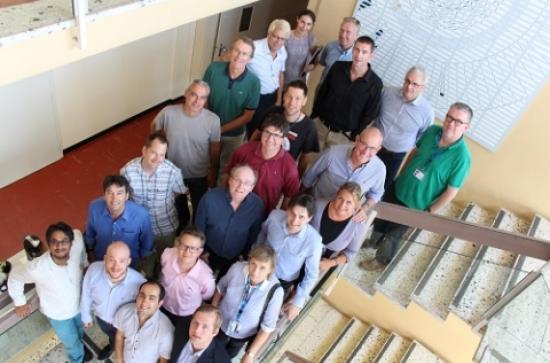
Maynooth University researchers were pleased to see the results of ICE-DIP, a large collaboration with CERN, Intel and others.
The project trained new PhD students in advanced information and communication technologies (ICT) and involved the Maynooth University Departments of Computer Science, Electronic Engineering and hamilton Institute. ICE-DIP was part of an innovative European Doctorate Industrial Program, led by CERN openlab and involving Maynooth University, Intel and DCU. The doctoral researchers have been co-funded by the European Commission (EC) as fellows at CERN. In addition to their academic training, they each completed 18-month secondments at Intel locations around the world, gaining in-depth experience of the latest generations of Intel hardware.
The project, which launched in 2013, has developed next-generation techniques for acquiring and processing data that are relevant for the trigger and data-acquisition systems of the Large Hadron Collider experiments. The developments made by the ICE-DIP researchers are of great interest for CERN’s future computing facility upgrades, other research laboratories and, potentially, other business sectors too.
“Thanks to the support of the EC through the Marie Curie European Industrial Doctorate scheme, CERN has been able to recruit bright young researchers and expose them to leading ICT technologies within the academic rigour of a PhD programme,” says Bob Jones, coordinator of the ICE-DIP project at the CERN. “We’re looking forward to applying the results to tackling the future big-data challenges of the LHC experiments.”
“This collaboration is very important for Maynooth University,” says Professor Bernard Mahon, Vice-President for Research. “Industrial doctoral programmes provide great value in integrating academic research with industry, and producing excellent scientists who understand commercial realities. The ICE-DIP project gave our staff and students the opportunity to work in the CERN environment and strengthened our close existing ties with Intel labs”
“The ICE-DIP project is an excellent example of how research can collaborate with industry to train the scientists, engineers, and ICT specialists of tomorrow,” says Eckhard Elsen, director for research and computing at CERN. “Education is a core part of CERN’s mission. "As well as the wider societal benefits that such training brings, we’re always keen to absorb and integrate bright ideas and fresh new perspectives in tackling the challenges of our evolving research programme.”
The ICE-DIP researchers’ results were presented in a public session on 14th September at CERN’s facilities in Geneva.
